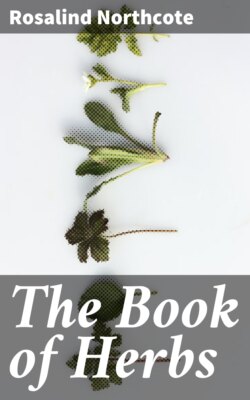Читать книгу The Book of Herbs - Rosalind Northcote - Страница 8
На сайте Литреса книга снята с продажи.
Sweet Basil (Ocymum basilium) and Bush Basil (O. minimum).
ОглавлениеTable of Contents
Madonna, wherefore hast thou sent to me
Sweet basil and mignonette?
Embleming love and health which never yet
In the same wreath might be.
To Emilia Viviani.—Shelley.
Basil is beloved of the poets, and the story of Isabella and the Basil-pot keeps the plant in memory, where it is itself never, or very rarely, seen. The opening lines of Drayton’s pretty poem beginning with Claia’s speech:—
Here damask roses, white and red,
Out of my lap first take I—
are well known, and it is a pity that the whole of it is not oftener quoted. Two maidens make rival chaplets, and then examine the store of simples just gathered by a hermit. Claia chooses her flowers for beauty, Lelipa hers for scent, and Clarinax, the hermit, plucks his for their “virtue” in medicine. Lelipa says:—
A chaplet, me, of herbs I’ll make,
Than which, though yours be braver,
Yet this of mine, I’ll undertake,
Shall not be short in favour.
With Basil then I will begin,
Whose scent is wondrous pleasing.
and a goodly number of sweet-herbs follows.
Parkinson[8] says of it, “The ordinary Basill is in a manner wholly spent to make sweete, or washing waters, among other sweet herbes, yet sometimes it is put into nosegays. The Physicall properties are to procure a cheerfull and merry hearte, whereunto the seede is chiefly used in powder.” With such “physicall properties” Basil is too much neglected nowadays. He also refers to the extraordinary but very general idea that it bred scorpions. “Let me, before I leave, relate unto you a pleasant passage between Francisius Marchio, as Advocate of the State of Genoa sent in embassage to the Duke of Milan, and the said Duke, who, refusing to heare his message or to agree unto the conditions proposed, brought an handfull of Basill and offered it to him, who, demanding of him what he meant thereby, answered him, that the properties of that hearbe was, that being gently handled, it gave a pleasant smell, but being hardly wrung and bruised, would breed scorpions, with which witty answer the Duke was so pleased that he confirmed the conditions, and sent him honourably home. It is also observed that scorpions doe much rest and abide under these pots and vessells wherein Basill is planted.” Culpepper,[9] too, had suspicions about it. “This is the herb which all authors are together by the ears about and rail at one another (like lawyers). Galen and Dioscorides hold it not fitting to be taken inwardly, and Chrysippus rails at it with downright Billingsgate rhetoric; Pliny and the Arabians defend it. Something is the matter, this herb and rue will not grow together, no, nor near one another, and we know rue is as great an enemy to poison as any that grows.” Tusser[10] puts both Basils in his list of “strewing herbs,” and also says:—
Fine basil desireth it may be her lot,
To grow as the gilliflower, trim in a pot;
That ladies and gentles, to whom ye do serve,
May help her, as needeth, poor life to preserve.
May’s Husbandry.
To which (in Mavor’s edition, 1812) is appended this prim note, “Garden basil, if stroked, leaves a grateful smell on the hand, and the author insinuates that it receives fresh life from being touched by a fair lady.” Both basils are annuals, though Bush Basil may occasionally live through the winter. They are small plants with oval leaves and white, labiate flowers. A modern gardener writes that sweet basil has the flavour of cloves, that it is always demanded by French cooks, and that it is much used to flavour soups, and occasionally salads. M. de la Quintinye,[11] director of the gardens to Louis XIV., shows that over two hundred years ago French cooks were of the same mind about basil as they are to-day; besides mentioning it for the uses just named, he adds, “It is likewise used in ragouts, especially dry ones, for which reason we take care to keep some for winter.” An Italian name for it is Bacia-Nicola.
